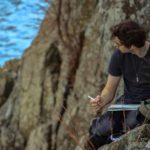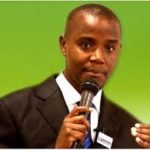By way of introduction to this version of gay Israel the story starts with a commentary on WorldPride held in Jerusalem August 2006 during the war with Hezbollah. It speaks to the difficulties that the Pride hosts encountered and the layers of conflict that seem indelible in Israeli culture today.
This story goes beyond WorldPride and is lengthy.
In order to make it more accessible it is divided into six parts:
(Part 1) Jerusalem WorldPride 2006
(Part 2) Gay Israel: Beyond WorldPride 2006
(Part 3) Aguda in Tel Aviv: Saving Lives
(Part 4) Private Lives: The Men and the Boys
(Part 5) Gay Jerusalem Scene
(Part 6) Gay Rights in Israel
Also see:
Gay Israel Gay Israel Stories
Gay Israel News & Reports 2000 to present
Gay Israel Photo Galleries
(Part 1)
Jerusalem WorldPride 2006
-Six Hurdles to Overcome
-WorldPride Review
It appears the cards were stacked against WorldPride 2006 (http://www.worldpride.net/)
First, the location for the event didn’t bode well. Jerusalem, for all its alleged holiness, is a tight conservative city with religious and political tensions surrounded on three sides by the homophobic Muslim world.
Second, the timing seemed doomed. WorldPride was supposed to happen in 2005 but was postponed because of the Israeli pullout from Gaza. Military troops and police, so the government claimed, were needed for that volatile action.
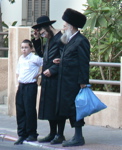 Third, as August 2006 drew closer the re-scheduled WorldPride became the target of unified public vicious attacks by the usually contentious fundamentalists from Islam, Judaism and Christianity. The queers and their perceived threat to the nations’ morality united the warring religions against folks who want to love in their own manner. They were vigorously backed by the orthodox mayor of Jerusalem, Uri Lupolianski.
Third, as August 2006 drew closer the re-scheduled WorldPride became the target of unified public vicious attacks by the usually contentious fundamentalists from Islam, Judaism and Christianity. The queers and their perceived threat to the nations’ morality united the warring religions against folks who want to love in their own manner. They were vigorously backed by the orthodox mayor of Jerusalem, Uri Lupolianski.
The good pious folks threatened violence and death if we dared to defile the streets of holy Jerusalem with a peaceful Pride march—never mind that the three religions have spilled enough of each others’ blood over the centuries to fill the Dead Sea.
Fourth, two weeks before WorldPride, as if sent by divine intervention—fervent prayer by fundamentalists!?—Hezbollah decided to launch missiles into Israel with not-unexpected Israel counter attacks. So another mid-east war raged for a month.
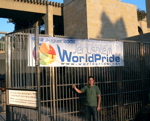 But Jerusalem Open House, the pint-sized host organization for WorldPride, did not back down and plans went forward to hold the event. The scheduled public street parade—one of numerous events in WorldPride– however, was canceled thanks to the hostilities, both from within and without the country, from clerics and militants with weapons of mass injury.
But Jerusalem Open House, the pint-sized host organization for WorldPride, did not back down and plans went forward to hold the event. The scheduled public street parade—one of numerous events in WorldPride– however, was canceled thanks to the hostilities, both from within and without the country, from clerics and militants with weapons of mass injury.
Fifth, as if this were not enough hardship, fear and anger erupted in the world gay ‘community’ in the form of protests, boycotts and avoidance of World Pride by LGBT individuals and groups.
For years sexual orientation has been able cut through the ethnic-religious-cultural divisions between Israelis and Arabs.
But now, for the first time this writer saw divisive tribal emotions overrule the unifying bond of homophilia. Our common force for love was undermined by ethnic anger; homosexuals split apart by national/religious/political loyalties. Gays divided against gays; Lebanon/Hezbollah sympathizers against Israeli sympathizers; occupiers against the occupied.
See boycott statements by several LGBT organizations:
http://www.boycottworldpride.org/
http://www.boycottworldpride.org/id17.html
http://www.boycottworldpride.org/id24.html
http://www.boycottworldpride.org/id16.html
http://www.quitpalestine.org/
Needless to say, the war, the tensions and the divisions resulted in many cancellations; instead of thousands of attendees there were only a couple of hundred, mostly from Israel and the USA.
 Sixth, in place of the cancelled street parade the hosts organized a non-violent vigil, ‘Protest Against Hatred’ (a legal gathering but without city approval). On the appointed day and hour a couple of hundred attendees from the decimated conference gathered near Liberty Bell Park and held a silent and obedient demonstration.
Sixth, in place of the cancelled street parade the hosts organized a non-violent vigil, ‘Protest Against Hatred’ (a legal gathering but without city approval). On the appointed day and hour a couple of hundred attendees from the decimated conference gathered near Liberty Bell Park and held a silent and obedient demonstration.
 Holding Rainbow and Israeli and Canadian flags, banners (“Jerusalem Is for All”) and posters (“The path to God is not always straight’) advocating love, equal rights and an end to homophobia the rally was surrounded by hundreds of local, state and military personnel who stood in the background, not interfering with the peaceful event–at first.
Holding Rainbow and Israeli and Canadian flags, banners (“Jerusalem Is for All”) and posters (“The path to God is not always straight’) advocating love, equal rights and an end to homophobia the rally was surrounded by hundreds of local, state and military personnel who stood in the background, not interfering with the peaceful event–at first.
However, as the vigil was ending, the event was turned into a confrontation with the sudden arrival of activist gay groups. Some said they were Queeruption, others said Black Laundry or Red-Pink (a gay Communist organization) whose intention was to harangue the police, rouse their handful of followers to rail against Israel’s occupation of Palestine and agitate against Israeli aggression in Lebanon. In short, they intended to create a disruption knowing they would get media attention, which they did.
This put the security forces on alert. To limit the disturbance and make a show of control local police rushed the ‘anarchists’ three or four times to remove vocal leaders. (This writer made the mistake of standing between the police and their target and was nearly knocked over in the rush to perform an extrication.) It wasn’t clear whether the individuals were arrested or just taken away from the scene.
 Thus WorldPride’s peace vigil against hatred was high-jacked by the agitators and drama queens (who had gathered earlier in Tel Aviv for their own separate meeting). The disruption was an intended part of Queeruption’s planned week of events, along with parties and beach outings, obviously with no coordination with Jerusalem Open House. On their web site they called it “Joining the demo in Jerusalem”.
Thus WorldPride’s peace vigil against hatred was high-jacked by the agitators and drama queens (who had gathered earlier in Tel Aviv for their own separate meeting). The disruption was an intended part of Queeruption’s planned week of events, along with parties and beach outings, obviously with no coordination with Jerusalem Open House. On their web site they called it “Joining the demo in Jerusalem”.
WorldPride Review
WorldPride 2006 was weakened by events beyond its control, but the brave hosts soldiered on as numerous and diverse events went mostly on schedule during the week.
There was day for youth (15-25) who visited the knesset (parliament) to meet with liberal Labor Party member Sheli Yachimovitch, chairperson of the government’s committee on children’s rights. Yachimovitch, from secular and left-leaning Tel Aviv, is a leader in the tough fight for gay civil rights in Israel. Someone commented, “This is remarkable because it’s the first meeting between Parliament and gay youth.” But it was not the first gay visit to the capitol building. Ariel Sharon met with gays in 2004.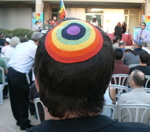
Reporter Michael Luongo wrote: “After the conference, the young people headed out to a community center to create a youth LGBT bill of rights. Something like 40 kids and their counselors were there. Like I said, these are the future of Israel–and after watching them, it all looks pretty bright.”
Another day featured a forum for physical and mental health issues related to LGBTs in Israel and America–including a panel on HIV/AIDS that discussed HIV testing. For more about HIV in Israel see Jerusalem AIDS Project web site.
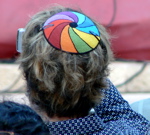 Conference delegates were welcomed on Sunday to a reception at Jerusalem’s City Hall thanks to the presence of Sa’ar Ran Nathaniel, Jerusalem’s first openly gay city council member. They certainly were not welcomed by the conservative mayor Uri Lupolianski, the self-righteous ultra orthodox rabbi who wanted to stop World Pride from happening in his ‘holy’ city. The insult of his presence-by-absence was dispelled by the witty Rabbi Sharon Kleinbaum (from New York’s Beth Simchat Torah congregation) who stole the moment by throning herself on the mayor’s very empty seat while pronouncing, “I want him to know that a lesbian rabbi sat in his chair,” much to the delight of the gathered.
Conference delegates were welcomed on Sunday to a reception at Jerusalem’s City Hall thanks to the presence of Sa’ar Ran Nathaniel, Jerusalem’s first openly gay city council member. They certainly were not welcomed by the conservative mayor Uri Lupolianski, the self-righteous ultra orthodox rabbi who wanted to stop World Pride from happening in his ‘holy’ city. The insult of his presence-by-absence was dispelled by the witty Rabbi Sharon Kleinbaum (from New York’s Beth Simchat Torah congregation) who stole the moment by throning herself on the mayor’s very empty seat while pronouncing, “I want him to know that a lesbian rabbi sat in his chair,” much to the delight of the gathered.
Religion and faith were the focus for two days as clerics from Israel and America (mostly) offered prayers and ideas for integrating spirituality and sexuality in a world that often separates these two vital human needs. Friday offered a Shabbat service at sunset.
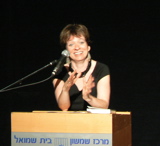 At the Multi-faith Convocation perhaps the most powerful speech of the week was given by Professor Chai Feldblum, an American woman professor and lawyer at Georgetown University, (photo right) also a political lobbyist and rights advocate, who forcefully and eloquently described how the gay/liberal community can reclaim ‘moral values’ as a progressive—vs conservative—platform and bring about legislative change that’s morally grounded in “nature, broad scripture and culture”, not narrow religious opinion. “Religion is not a sufficient base for morality. Morality must include happiness, safety, integrity, fairness and equality and be inclusive of all sexualities.” See her ‘Moral Values Project’ for a closer understanding of her impressive work.
At the Multi-faith Convocation perhaps the most powerful speech of the week was given by Professor Chai Feldblum, an American woman professor and lawyer at Georgetown University, (photo right) also a political lobbyist and rights advocate, who forcefully and eloquently described how the gay/liberal community can reclaim ‘moral values’ as a progressive—vs conservative—platform and bring about legislative change that’s morally grounded in “nature, broad scripture and culture”, not narrow religious opinion. “Religion is not a sufficient base for morality. Morality must include happiness, safety, integrity, fairness and equality and be inclusive of all sexualities.” See her ‘Moral Values Project’ for a closer understanding of her impressive work.
A energetic film festival happened during the week with no serious problems as nearly twenty films from six countries were screened, including the highly rated and intense ‘Trembling Before G-d’ (about orthodox Jews and their homosexuality).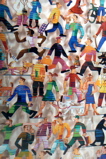
Half a dozen art galleries were busy juggling nearly twenty different shows related to diverse aspects of sexuality, personal identity and eroticism. A gathering of literary writers to discuss Hebrew literature—in Hebrew–was also offered on two days.
Throughout the week entertainments and parties for men, women and mixed were presented: live rock performances, soul singers as well as evenings with drag queens and “international gender shows featuring local and foreign royalty.”
The highlight of the week for some attendees were ‘field trips’ to troubled areas of Jerusalem. Rabbis for Human Rights sponsored a group visit to Palestinian neighborhood to see and hear of the hardship (homes demolished, arrests) of living under the occupation of their home area.
Another tour of Jerusalem’s ‘dark side’ was offered free of charge by Amos Gil, chairman of Ir Amim a non-partisan advisory and monitoring organization in Jerusalem that observes and analyses military, political and social events including the construction of the separation wall.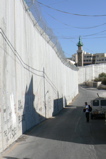
For five anguished hours we followed the tortuous and divisive route of the wall as Amos described how it slashed through Israeli and Palestinian neighborhoods—physically and mentally . Amos clearly stated there could never be a Jerusalem solution without a Palestinian solution.
On another day, less painful but still distressing, was the quiet protest sponsored by Jerusalem Open House at pre-arranged place along the separation wall. For an hour we were permitted to stand silently—watched over by armed guards–at the Bethlehem checkpoint in the wall to see the hills and buildings beyond, including the Church of the Nativity where Jesus is alleged to have been born.
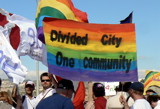 With several flags and banners displayed we were told there was a Palestinian refugee camp immediately on the other side of this section of the wall. The whole area looked like a penitentiary and it wasn’t clear who was inside or who was outside. It felt as if both were inside.
With several flags and banners displayed we were told there was a Palestinian refugee camp immediately on the other side of this section of the wall. The whole area looked like a penitentiary and it wasn’t clear who was inside or who was outside. It felt as if both were inside.
The following day, as the ultra-orthodox Jews in their big black hats, long hair, beards and braids, full-length black coats (in 90 degree weather) hunkered down for the Sabbath–Friday sunset until moonrise on Saturday—Jerusalem Pride offered music bands, food, alcohol and singers late into the night.
On a quieter note, an evening “encounter” of Arabic language love songs and pop songs and dance was offered at a different venue by Eastern culture expert Alon Ben Yahuda.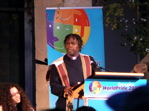
Ending the week on Saturday there were daytime meetings for LGBT folks over fifty, bi’s and their friends, parents of lesbians and gays topped off with a concert by “the grand pianist drag-diva” Jaqueline Jonee followed by the Spicy Tigers on Speed, a live gender-bender show from Berlin later in the night.
There was no formal conclave or concluding address to end WorldPride, no official proclamation or announcement. Given the scheduled and unscheduled happenings and changes, by Saturday most attendees were packing up to return to the real world of work and war, discrimination and homophobia. Some were energized and deeply touched by the experience of ‘besieged’ Jerusalem while others improved their tans on the beaches of Tel Aviv or danced away at one of the lively clubs there.
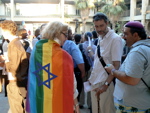 It was a week for all seasons both in Jerusalem and Tel Aviv—for the pious, the secularists, for men and women and transitioning, young and old, for those politically, sexually or literarily aroused, for protesters and advocates. There were prayers and parties, tears and laughter, Jewish jokes and Lesbian rabbis.
It was a week for all seasons both in Jerusalem and Tel Aviv—for the pious, the secularists, for men and women and transitioning, young and old, for those politically, sexually or literarily aroused, for protesters and advocates. There were prayers and parties, tears and laughter, Jewish jokes and Lesbian rabbis.
WorldPride may have been a minor blip on the radar of Israel’s hectic lifescape but, as one participant said, “we have planted another seed for human rights; despite all the problems Israel is still a democracy and offers gays and lesbians more life than anywhere else in this part of the world.”
For additional detailed reporting about Jerusalem Pride see noted gay reporter Michael Luongo’s stories:
http://www.slate.com/id/2147671/
http://www.gaycitynews.com/gcn_533/withhopeworldpride.html
http://ebar.com/common/inc/article_print.php?sec=news&article=1066
http://uk.gay.com/article/4860
http://www.gaycitynews.com/gcn_532/prideamistthebombs.html
http://www.xtra.ca/public/viewstory.aspx?AFF_TYPE=4&STORY_ID=2035&PUB_TEMPLATE_ID=3
(Part 2)
Gay Israel: Beyond WorldPride 2006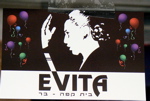
-Evita in Tel Aviv
-Rothschild Boulevard
-Independence Park
-Gay Beach
-Electricity Park
-Black Laundry
If you want to find the gay Israel that most LGBT men and women know, go for a stroll along Tel Aviv’s leafy tree-lined Rothschild Boulevard on any day of the week. You won’t find a parade there or the gay center. Not one pink disco or pair of hand-holding queens flouncing in sequins down the wide promenade that runs for almost a kilometer down the middle of the boulevard just south of downtown. The gay beach is a couple of kilometers north, near the waterfront Hilton. There are no bushy areas along Rothschild that suggest nocturnal sex play.
What you will see are numerous blue and white Israel flags hanging from balconies of the many apartment buildings that line both sides of the street. You will notice numerous trendy cafes and restaurants with names such as Moses, Chocolate, Hillel or Tel Aviv Brew House and Spoleto ‘A Slice of Italy’.
 Near the corner of Rothschild and Havne Street, on the ground floor of an stylish office building, is another restaurant/bar/lounge called Evita. An unsuspecting visitor will walk past the place with little more than a glance. A suspecting and knowing visitor will recognize the name as one of many stars in the pantheon of famous gay icons. (Judy. Barbra, Noel, Oscar, Elton…)
Near the corner of Rothschild and Havne Street, on the ground floor of an stylish office building, is another restaurant/bar/lounge called Evita. An unsuspecting visitor will walk past the place with little more than a glance. A suspecting and knowing visitor will recognize the name as one of many stars in the pantheon of famous gay icons. (Judy. Barbra, Noel, Oscar, Elton…)
This is where the discovery of gay Israel begins; well, one of them at least. Evita is the most prominent, stylish and openly gay commercial venue in Israel, a country the size of Massachusetts with an army bigger than Italy’s. But you will look in vain to find any queer signs or rainbow banners here. They’re not needed. Everyone who wants to know understands the status of this place as an eatery with gourmet food, a bar with casual ambience, a lounge with soft sofas, recessed lighting and a huge floral arrangement in the corner. The décor clearly signals gay style and class.
The bar/restaurant, owned by partners Shai, David and Arnon, also offers outside seating where patrons chill out after work (if you can call 80 degrees ‘chilling’).
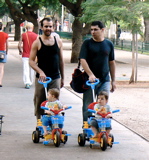 The people who come here range in age from (illegal) 16 to 65. Many of the men sport the popular clone look of shaved head (or very short hair), dark T-shirts and jeans. Women are a bit more colorful in blouses and pants.
The people who come here range in age from (illegal) 16 to 65. Many of the men sport the popular clone look of shaved head (or very short hair), dark T-shirts and jeans. Women are a bit more colorful in blouses and pants.
Scattered occasionally are heterosexual couples enjoying the background house music along with their food, drinks and bubbly conversation. (Unfortunately more than half of the customers smoke cigarettes–as they do all over Israel.)
It’s a cosmopolitan gay and straight crowd who inhabit Tel Aviv with an air of laissez-faire typical of any western city of well educated, financially secure, professional singles or partnered adults with more on their minds than sexual orientation or bedroom discretions. On any evening the pace and tenor of Evita is predictable calm.
A handsome waiter named Kobe took my order for vegetable lasagna and salad—thankfully they offered large or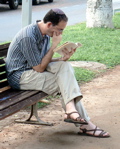 small portions. The bill was served with toothpicks and a handi-wipe. The place is very smooth, professional and stylish.
small portions. The bill was served with toothpicks and a handi-wipe. The place is very smooth, professional and stylish.
Around the Corner from Evita
Meanwhile out on the Boulevard more citizenry partake of the cafes and the promenade. Here a careful observer can see even more gay and lesbian folks (among countless straight folk pushing baby strollers) walking their dogs, sitting on benches reading a book, chatting and walking, stopping for a coffee at one of the kiosks.
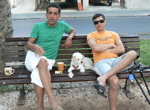 One male couple posed happily for me with their poodle. Two others walk closely together not quite holding hands but touching frequently while a trio sit in Stuzzi café animatedly discussing a hot topic.
One male couple posed happily for me with their poodle. Two others walk closely together not quite holding hands but touching frequently while a trio sit in Stuzzi café animatedly discussing a hot topic.
 This comfortable neighborly scene—probably the most common–is but one face of gay Israel. As I was photographing Evita’s exterior I noticed two colorful posters on a nearby wall that drew my attention. They were advertising (in Hebrew) two obviously gay events, one a disco party called ‘Gays and Roses’ at Haoman Club in Tel Aviv (as an offshoot of WorldPride in Jerusalem); the other a drag show at the Scimtar Theatre. Gay Israel was becoming more varied although I could see these were particular events and not every night.
This comfortable neighborly scene—probably the most common–is but one face of gay Israel. As I was photographing Evita’s exterior I noticed two colorful posters on a nearby wall that drew my attention. They were advertising (in Hebrew) two obviously gay events, one a disco party called ‘Gays and Roses’ at Haoman Club in Tel Aviv (as an offshoot of WorldPride in Jerusalem); the other a drag show at the Scimtar Theatre. Gay Israel was becoming more varied although I could see these were particular events and not every night.
 I continued walking, across from the Tel Aviv Brew House café yet another poster caught my eye. Next to one (actually these posters are plastered up ten at a time in clusters) advertising Led Zeppelin’s upcoming gig was a spicy set of posters for a “Mr. Big Dick Competition” (no kidding!) at the Vox Club (no address or date but with a phone number). And the posters, all eight or ten of them, were in bright blue color with bold print and a huge sketched phallus just to make sure there was no mistaking the event theme!
I continued walking, across from the Tel Aviv Brew House café yet another poster caught my eye. Next to one (actually these posters are plastered up ten at a time in clusters) advertising Led Zeppelin’s upcoming gig was a spicy set of posters for a “Mr. Big Dick Competition” (no kidding!) at the Vox Club (no address or date but with a phone number). And the posters, all eight or ten of them, were in bright blue color with bold print and a huge sketched phallus just to make sure there was no mistaking the event theme!
Vox is a popular disco that’s straight most nights but is gay on Fridays.
Other lively places such as Minerva disco has different theme nights throughout the week. The city also has two gay saunas, Paradise and City Sauna, a sex shop and several other bars and discos that are listed in the Pink Times. Most of them don’t come alive until after 11 PM and some are gay on certain nights of the week.
Most of them don’t come alive until after 11 PM and some are gay on certain nights of the week.
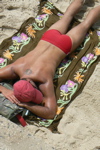 Daytime Tel Aviv ‘action’ is visible anywhere but most notably in Independence Park, adjacent north of the Hilton Hotel, perhaps Israel’s most famous cruise park (along with Jerusalem’s Independence Park) where a labyrinth of trees and shrubs offer semi privacy, adventure–and some risk. Some men have (not-unhappily) complained they got lost in there!
Daytime Tel Aviv ‘action’ is visible anywhere but most notably in Independence Park, adjacent north of the Hilton Hotel, perhaps Israel’s most famous cruise park (along with Jerusalem’s Independence Park) where a labyrinth of trees and shrubs offer semi privacy, adventure–and some risk. Some men have (not-unhappily) complained they got lost in there!
But the place is perhaps not as wild as one might imagine. Russell Lord reported: “During the day there are families picnicking, young people and seniors alike walking their dogs as well as LGBT’s hanging out, sometimes cruising, often just sitting, enjoying the pastoral setting and chewing the fat with friends. As nights falls, the park morphs into the premier outdoor cruising spot in the country. However, also at night, I know that many people go, meet friends and just hang out.
(I stress ‘outdoor cruising spot’, because the Israeli web site Atraf (meaning ‘craziness’) has certainly taken a far lead in the cruising/meeting place.) Atrafdating is the cruise portion of the site. Atraf is the social/activities portion of the site. Both are in Hebrew.
“As part of a known couple, I would have no qualms about taking a walk to the beach on a summer day, strolling through Independence Park, sitting on one of the benches with a nice view of the sea and catching a few rays of sun. For sure an acquaintance would walk by – and stop for a chat.”
A book entitled ‘Independence Park-The Lives of Gay Men in Israel’ was published in 1999.
 On the ‘gay beach’ across from the Hilton Hotel one can see numerous male and female couples and singles among the many more hetero tourists who pack the beaches of Tel Aviv. Even during the war with Hezbollah, in July 2006, the beaches were busy with sun-seekers. Tel Aviv has miles of white sand beaches that attract tens of thousands of Europeans, especially French, in the summer.
On the ‘gay beach’ across from the Hilton Hotel one can see numerous male and female couples and singles among the many more hetero tourists who pack the beaches of Tel Aviv. Even during the war with Hezbollah, in July 2006, the beaches were busy with sun-seekers. Tel Aviv has miles of white sand beaches that attract tens of thousands of Europeans, especially French, in the summer.
For a more detailed listing of venues and times see the Pink Times web site or the Aguda web site.
Electricity Park
So where does Electricity Park (EP), in Tel Aviv’s ‘red light’ district, fit into this mosaic of gay life in Israel?
It does and it doesn’t. Most LGBT Israeli would prefer to ignore this dark side of the gay scene and pretend it’s an ‘other’ place outside their lives, which it is for most.
For a number of years the park has been a nocturnal shopping mall of sorts where hunters and the hunted (often kids from a lower socioeconomic level) have sought different ends. The hunters looking for sex while the hunted wanting money–hustlers and their johns cruising each other on foot or in cars in the dimmed streets.
In 2003 this once seedy park and rundown area were gentrified by the city into a lovely small park with benches and lots of light. Many of the nearby abandoned buildings were either gutted or renovated. Therefore, the once-infamous night activity in this park and the area has decreased.
Some ‘action’ is still to be found there as numerous ‘givers and takers’ continue to frequent the place. However, it’s heyday is generally consider to be over.
Gentrified or not, highly active or slowly active, the park has served and still serves as an integral part of gay Israel for a certain ‘ non-mainstream sub-community’ under the rainbow umbrella.
It’s easy to label some of the denizens of EP as outsiders: drag queens, money-boys, closeted husbands cheating on their wives, sex addicts in need of a fix.
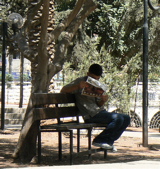 But what label fits the many Palestinian young men who are truly gay, some as young as 15, who have come to EP over the years after sunset on especially on Fridays? Surely the misfit label is not a fair one for frightened refugees who have escaped the mortal danger and shame of Gaza or the West Bank or a refugee camp in Jordan and have no money and no legal way to earn it. (This is not to suggest that some gay Palestinians don’t also cruise Independence Park as well.)
But what label fits the many Palestinian young men who are truly gay, some as young as 15, who have come to EP over the years after sunset on especially on Fridays? Surely the misfit label is not a fair one for frightened refugees who have escaped the mortal danger and shame of Gaza or the West Bank or a refugee camp in Jordan and have no money and no legal way to earn it. (This is not to suggest that some gay Palestinians don’t also cruise Independence Park as well.)
In June 2004 author Dan Baron (see News and Reports #13) visited EP and spoke to one man who reported, “the Palestinian Authority police brought me in, held me for hours. During one round of questioning, they made me strip and sit on a Coke bottle. It hurt. And all the time I was more worried my family would learn why.”
Baron reported that “torture by Palestinian Authority security services or vigilante attacks by relatives is a fate suffered by countless gays in the West Bank and Gaza Strip, where sodomy carries a jail term of three to 10 years. According to Shaul Gonen of Aguda, Israel’s homosexual rights association, at least three Palestinian runaways have been abducted by vengeful kinsmen, never to be heard from again. ‘Being gay in the P.A. is, quite simply, deadly,’ Gonen said.”
Threatened at home and unwelcome in Israel, Palestinian gays also seek comfort, love and acceptance. With virtually no ordinary outlet for their longings, discreet ‘sleeping with the enemy’ seems to offer a thin glimmer of hope for such emotional pleasure.
But such closeness is very vulnerable: purchased with money, satisfaction is barely reassuring and is highly suspect.
The men/boys here are also vulnerable to betrayal. Informers (other gays being blackmailed by Israel secret police or the PLO or Hamas) are not uncommon and possible treachery lies around the next corner or the next sexual encounter. Israeli security forces do not look kindly on such escapees; deportation is not uncommon. Although they are likely aware that homosexuals face recriminations at home they may deport them anyway–especially if a gay person can’t be blackmailed to find other illegals. What use is he? And simply being gay may or may not make things worse depending on the attitude of the local commander.
Consequently gay Palestinians quickly learn covertness and disguise as a way of life. Motivated by nervous fear, street-smart gays practice Hebrew, without Arabic accents. Wearing military tags or a Star of David necklace also help in the mask making.
Baron reports: “They save up money for private medical care in lieu of hospital visits when they fall ill. The Electricity Park crowd has learned to spot plainclothes police from afar. The really lucky ones adopt a new identity altogether. The 30-year-old runaway from a village near Jenin works in a Tel Aviv restaurant using an identification card loaned to him by an Israeli Arab friend. He lives with his Jewish partner in the quiet Tel Aviv suburb of Holon. ‘With any luck, I’ll go unnoticed until there is peace,’ ” he said.
For most other gay Palestinians habitués of EP such quiet tenuous security is merely a restrained dream.
(In the past several years there have been reports and films about mixed Arab-Israeli couples, male and female, portraying the dire and daunting circumstances of everyday life as well as the psychological strain resulting from different religious and cultural traditions—not to mention the anguish of family alienation. See Stories)
Black Laundry
Also based in Tel Aviv is Black Laundry, (Kvisa Shchora), a direct action group of lesbians, gays and transgenders against the occupation and for social justice.
In their literature, Kvisa Shchora states they try to “stress the connection between different forms of oppression–our own oppression as lesbians, gays and trans people enhances our solidarity with members of other oppressed groups”, most notably, the Palestinians.
 This writer was not able to talk directly to Black Laundry members during the disruption of the Peace rally against hatred in Liberty Park (during WorldPride week) where police and demonstrators created a highly charged situation. However, through their actions Black Laundry activists believe that “it is hypocritical to have pride in gay liberation while Israel continues to occupy parts of Palestine”. They also protest the commercialization of LGBT and queer culture.
This writer was not able to talk directly to Black Laundry members during the disruption of the Peace rally against hatred in Liberty Park (during WorldPride week) where police and demonstrators created a highly charged situation. However, through their actions Black Laundry activists believe that “it is hypocritical to have pride in gay liberation while Israel continues to occupy parts of Palestine”. They also protest the commercialization of LGBT and queer culture.
The group often employs performance art to convey messages about Palestinian liberation, animal rights, queer rights, sexual freedom, body oppression, and anti-capitalism.
The group also “fights alongside other LGBTQ groups to fight gay repression in the county and also work closely with other radical left groups, including Anarchists Against the Wall. Their stated intention is not to educate Palestinians on gay liberation but rather to offer solidarity in their struggle for liberation”; however, some believe that they have had a positive effect on the typically conservative culture of Palestine.
See also: New York University Center for the Study of Gender and Sexuality
2005 lecture by Amalia Ziv, Tel Aviv University: PERFORMATIVE POLITICS IN ISRAELI QUEER ANTI-OCCUPATION ACTIVISM
The Israeli queer anti-occupation group Black Laundry emerged in 2001 following the second Intifada. The talk will situate the group in relation to mainstream LGBT politics and traditional left politics in Israel, and explore its implications for citizenship, queer identities, and political subjectivity.
Amalia Ziv teaches in the Department of Literature and the Women Studies Program at Tel Aviv University. She has published on feminist pornography and lesbian bars in the Holy Land, and is a co-editor of “Beyond Sexuality: Selected Papers in Lesbian & Gay Studies and Queer Theory”, Tel Aviv: Hakibbutz Hameuchad, 2003.
(Part 3)
-Aguda national Gay Organization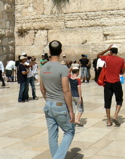
-A Gay Palestinian’s Escape
A very different LGBT establishment can be found on Nachmani Street in Tel Aviv called Aguda, Israel’s nationwide gay organization that has four main branches around the country in addition to 24 towns where affiliated groups meet regularly.
At Aguda’s headquarters, under the leadership of Mike Hamel and Shaul Gonen, things are not as calm and predictable as Evita. It serves as a social center for over 60 specialized groups, an educational outpost, a fundraising non-profit organization, a political action committee, a counseling clinic, a phone hotline, safer sex/AIDS advisory center as well as the publisher of the country’s only magazine ‘Pink Times’, edited by Raz Goldman.
As an organization Aguda has been operating for over thirty years. In the early years gays coming to Israel from all over the world were marginalized and unaccepted by the conservative Christian-Jew-Muslim ethos that was congealing in the country. Since Israel prided itself as a democracy and a country for everyone from everywhere, it was clear there was a need to speak out and protect gays from the collective homophobia that people brought along with their suitcases, cultural and religious traditions and bank accounts.
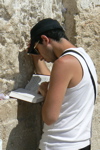 Today, three decades later, Aguda is still busy trying to integrate gay immigrant Jews–especially the large Russian orthodox population (see story)–into Tel Aviv’s secular society. Many have a hard time reconciling their sexuality with their religious traditions.
Today, three decades later, Aguda is still busy trying to integrate gay immigrant Jews–especially the large Russian orthodox population (see story)–into Tel Aviv’s secular society. Many have a hard time reconciling their sexuality with their religious traditions.
Aguda offers support groups, over 60 of them, with specialized needs, from alcoholics anonymous, to teens, to sports, politics, religion and education. In cooperation with the city, housing and counseling is available to homeless LGBT people. It produces educational seminars to police forces, military leaders, teachers—anyone with public influence who may knowingly encounter gay people. There is a library offering the country’s largest collection of LGBT materials.
A quiet but crucial service, called the Rescue Project, is headed by Shaul, a loving bear of a man with a welcoming smile and always time to talk about the Project. It is a human rights project offered as a passageway for LGBT Palestinians (or anyone) fleeing persecution from their native culture. Aguda cooperates with the Israeli government, Amnesty International and the UN Refugees Agency in providing legal aid, shelter and practical advice to refugees.
Of Palestinian descent, Shaul is tireless in his efforts to rescue young lives from severe punishment or death in the homophobic Muslim society.
On the day of my visit I witnessed Shaul in action. I was invited to attend a discreet meeting between a Palestinian youth, a young man of 18–with Shaul as his Aguda advocate/translator–and concerned sympathizers with connections to a western embassy. His story and his association with Aguda follows here:
Ali is 18, handsome with dark brown eyes and broad eyebrows, smooth face and typical Arab full lips. But his mouth doesn’t smile much; he has little to smile about. He is a gay Palestinian hiding in Israel. Completely cut off from his family, culture and whatever normal life can be eeked out in the refugee camp just outside Ramallah (where former Israel-based Palestinians fled after one or more of the wars)—a Palestinian refugee camp in Palestine.
Ali (not his real name) has been brought by Aguda to a meeting at a beachfront restaurant to talk to representatives of a western country whose immigration policies might be flexible enough to consider granting Ali emergency asylum.
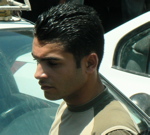 Generic photo–not Ali Generic photo–not Ali |
Ali sits nervously opposite the inquiring faces who want to hear his story, how he was discovered to be gay, the reaction of his family, his escape into Israel and his life in hiding in Tel Aviv. The questions can’t seem to come fast for the eager inquirers but the answers are slowed down by the need for translation.
About two years ago, reports Ali hesitantly, his eyes darting around watching for police, he was caught by a cousin having sex with another boy. He was exposed to his family, which resulted in physical abuse that escalated into violence when his brother attacked him with a knife.
Homosexuality in the Palestinian culture is a grave dishonor to a family. Sometimes it can be hidden if the family members are agreed but if neighbors find out the family risks certain humiliation and scorn from the community—in addition to living in the shadow of an ‘honor killing’ by a relative or from a religious fatwa of death for the ‘defiler’.
 As the western visitors squint in the bright sunshine, shaded by the colorful restaurant umbrellas, carefree tourists frolicked on the beach and in the clear blue water of the Mediterranean, laughing and shouting and playing paddleball. Most are from European Union countries where homosexuality is legislated as a protected status (along with age, gender, race, religion, etc), although the statute is not equally applied throughout all EU members.
As the western visitors squint in the bright sunshine, shaded by the colorful restaurant umbrellas, carefree tourists frolicked on the beach and in the clear blue water of the Mediterranean, laughing and shouting and playing paddleball. Most are from European Union countries where homosexuality is legislated as a protected status (along with age, gender, race, religion, etc), although the statute is not equally applied throughout all EU members.
As Ali tells about his brother’s attack, he raises his arms to reveal several scars, as well as on his shoulder and back. The interviewers are visibly moved to see this handsome young man’s beauty marred by the slash marks on his smooth flesh. They ask Shaul what would happen if he returned to Palestine and the answer was already evident—he would be dead within days.
More discussion follows about how embassies and consulates operate within appropriate jurisdictions. No consulate in Ramallah, the Palestinian capital, could intervene in a domestic case to save Ali from such a fate. The Palestinian authorities would refuse any interference claiming this was a family matter for the family to settle in ways they saw fit.
Ali had no choice but to run away that same day, bleeding, and walk for miles to find a place where Israel had not finished building the 25-foot high separation wall that now cuts off the Palestinian West Bank from eastern Jerusalem. After hiding in Jerusalem then Tel Aviv he found out about Aguda and made a hesitant attempt to establish contact.
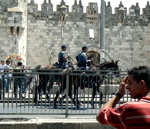 Infusing and complicating this contact, over months, is the extreme distrust on both sides. Palestinian suicide bombers have sneaked into Israel over recent years and slaughtered unarmed civilians. Israeli military have returned fire with heavy artillery, tanks and bulldozers also causing death and destruction. Slowly over time Ali was able to convince Aguda that he was not a suicidal killer and Aguda convinced Ali they did not intend to turn him over to the police.
Infusing and complicating this contact, over months, is the extreme distrust on both sides. Palestinian suicide bombers have sneaked into Israel over recent years and slaughtered unarmed civilians. Israeli military have returned fire with heavy artillery, tanks and bulldozers also causing death and destruction. Slowly over time Ali was able to convince Aguda that he was not a suicidal killer and Aguda convinced Ali they did not intend to turn him over to the police.
Although after so much bloodshed and misery the trust, I think, is not wholly clean. Aguda has known this young man for only a few months. Is he telling the whole truth? Is he really gay or using it as a ruse to get out of Palestine? Are the scars on his body, real as they are, from an assailant or self-inflicted to build a strong case and evoke sympathy?
Aguda replies to such doubts in the processing of Palestinian gays. The young men are told how the process of applying for asylum or refugee status will irrevocably ‘out’ them to many people who work in Israel on behalf of human rights as well as to the immigration personnel in the target country. Eventually everyone who knows Ali personally will know him to be gay.
 It is a big risk for him, adding another layer of possible discrimination against him. That is, if he is arrested his gay status will not protect him as it does an Israeli citizen and will surely condemn him in Palestine. And there is still homophobia among Israeli officials at all levels despite the many consciousness-raising seminars given by Aguda to police and military throughout the country.
It is a big risk for him, adding another layer of possible discrimination against him. That is, if he is arrested his gay status will not protect him as it does an Israeli citizen and will surely condemn him in Palestine. And there is still homophobia among Israeli officials at all levels despite the many consciousness-raising seminars given by Aguda to police and military throughout the country.
Ali risks arrest, time in jail (perhaps a couple of years while his case is pending or being appealed), deportation or murder. It’s no wonder he smiles very little, and then nervously so. Presently he lives at a secret location in the house of a supporter of Aguda and is able to find sporadic undocumented work (many Palestinians have legal residence or work status in Israel so it’s not unusual to see them doing manual work in restaurants or construction). He has few friends.
Among Palestinian Israelis trust is also a delicate commodity. It’s not unheard of for other Palestinians (in Israel legally) to be paid by the Israeli police to help find illegal residents and workers. On the other side of the wall it is also known that gay (or alleged gay) Palestinians may blackmail or betray fellow gays to Palestine authorities for money or to secure safe living for themselves.
During the interview the western representatives buy Ali a hearty lunch while continuing their questioning about conditions for gays in Palestine: if he communicates with his parents, where he might want to go from Israel, trying to discern the seriousness and sincerity of the boy.
 Toward the end they ask if he has any money, which he doesn’t. Obviously touched by his plight they spontaneously offer him several hundred shekels (about US$100), which he reluctantly takes at the urging of Shaul. He seems humbled and grateful at the offering.
Toward the end they ask if he has any money, which he doesn’t. Obviously touched by his plight they spontaneously offer him several hundred shekels (about US$100), which he reluctantly takes at the urging of Shaul. He seems humbled and grateful at the offering.
But then it is time to go. Neither Ali nor Shaul are comfortable being out in public where security guards and police regularly patrol. At any moment an officer could demand to see Ali’s residence papers. Lacking any he would be taken immediately into custody and into a decidedly more unhappy situation. As quickly as he appeared he was gone, with Shaul his only link to the future, back into hiding.
See related stories: ‘Unspeakable Love’ by Brian Whitaker and ‘A Gay Palestinian Speaks Out’
(Part 4)
Private Lives: The Men and the Boys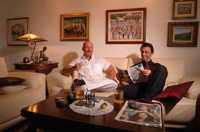
-Russelll and Avi-the Men
-Tal and Mykel-the Boys
Russelll and Avi—the Men
When you mix cultures you get heat. And if Israel is anything it is a stew or melting pot or mosaic of immigrants. More often than an Israeli is someone from somewhere else who chose to move to the country for Jewish reasons (religious or cultural).
Russelll 48, (on left in photo) is from Brooklyn and Avi, 48, is Israeli from Yemeni descent; they are a couple in Tel Aviv. Russelll is a travel agent and a contributor to GayMiddleEast.com, the major gay travel and information web site in the area. Avi, a former banker, now loves his work as a concierge at one of Tel Aviv’s 5-star hotels.
As a couple they are part of the ‘mainstream’ gay fabric of Israel. Secure in their sexual identities (the issue is hardly discussed except with inquiring reporters from abroad) their lives focus around their home life, career schedules, family responsibilities and, when called upon, support and advocacy for LGBT causes.
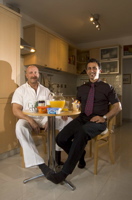 Russelll reported: “Actually, we live very conventional lives. Work, gym, going out to dinner with friends, shopping, cleaning, more gym. We love to travel and take any opportunity we can to travel overseas. Over the years we’ve met many wonderful people from all over the world – and we try to keep up on our friendships with many of them. Regarding friends, I would say that not all, but most of our friends are also coupled. Most are our age – or a bit younger.
Russelll reported: “Actually, we live very conventional lives. Work, gym, going out to dinner with friends, shopping, cleaning, more gym. We love to travel and take any opportunity we can to travel overseas. Over the years we’ve met many wonderful people from all over the world – and we try to keep up on our friendships with many of them. Regarding friends, I would say that not all, but most of our friends are also coupled. Most are our age – or a bit younger.
Our social life basically revolves around friends. There are plenty of huge dance clubs in Tel Aviv, and we certainly do make it our business to visit them each at least once a year. Our main social life is more in the line of dinner with friends – their place, ours, or together at a restaurant.
We try to do volunteer work at the Aguda. Avi and I don’t have kids, so…we try to do a little something to make this crazy place just a little bit better. I still have many years to go (Inshalla), but I do joke with the younger people at the Aguda that soon they’ll call me Russelll Quentin Crisp.”
Together for nearly 25 years they think legal recognition of their relationship is long overdue. As of this writing there is an Israeli Supreme Court case pending regarding gay marriage. Five Israeli couples, including Russelll and Avi, went to Canada last year and were legally married. Returning home the legality of their bond was of course not recognized by any statute in Israel law.
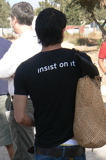 In a carefully orchestrated move with the other couples they petitioned the Supreme Court in 2006 to consider the inequality and discriminatory nature of Israel’s marriage regulations. A major barrier to their victory is that marriage law in Israel is defined by Orthodox Jewish law in yet another conflict of new secular ideas versus old religious traditions, a clash of attitudes that emerges daily across the country.
In a carefully orchestrated move with the other couples they petitioned the Supreme Court in 2006 to consider the inequality and discriminatory nature of Israel’s marriage regulations. A major barrier to their victory is that marriage law in Israel is defined by Orthodox Jewish law in yet another conflict of new secular ideas versus old religious traditions, a clash of attitudes that emerges daily across the country.
Russelll is hopeful their case will result in an affirmative decision because, by coincidence, the Supreme Court is about to appoint a new chief justice and the leading candidate is a woman. “In a patriarchal tradition–such as Judaism–any woman knows well the subtle and overt meaning of discrimination. It’s felt despite being our being a ‘modern’ country. I think she will side with us—whether she becomes chief or not.” (See article: http://www.bpnews.net/bpnews.asp?ID=22990)
Russelll has been a volunteer, activist and advisor to the major gay organizations in Israel and his efforts have brought him respect in the community.
Tal and Mykel—the Boys
During my visit to Evita I noticed a young gay couple sitting in one of the sofa chairs; they were sprawled across each other caressing and exchanging kisses (wet and dry) now and then. No one else seemed to notice their warm passion including the hetero or lesbian couples nearby.
At an appropriate pause in their cooing I asked if I could interview them if I bought them a drink. It didn’t take long for them to agree, “you got yourself a deal” said the apparently older one. We went to the outside patio where it was much quieter and introduced ourselves.
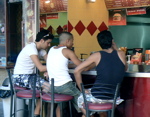 Tal and Mykel had been a couple for a lengthy two days. They met in an Israeli chat room (Nana) and arranged to meet at a mall. Mykel is 17 and entering his last year of high school while Tal is 16 and will enter his junior year in the fall. “The chemistry was good so we hooked up,” said Mykel, the more articulate of the two and with full command of English. Not surprising since he was born in Boston, Massachusetts and came to Israel for the first time when he was four. His deceased father was Swedish and his mother is Russian born but Mykel is not Jewish and not yet a citizen of Israel—and doesn’t want to be one.
Tal and Mykel had been a couple for a lengthy two days. They met in an Israeli chat room (Nana) and arranged to meet at a mall. Mykel is 17 and entering his last year of high school while Tal is 16 and will enter his junior year in the fall. “The chemistry was good so we hooked up,” said Mykel, the more articulate of the two and with full command of English. Not surprising since he was born in Boston, Massachusetts and came to Israel for the first time when he was four. His deceased father was Swedish and his mother is Russian born but Mykel is not Jewish and not yet a citizen of Israel—and doesn’t want to be one.
Over the subsequent 15 years Mykel’s mother moved back and forth between Boston and Israel most recently settling in northern Israel in the town of Nahariya—an unfortunate choice because it became one of the places bombarded by the recent Hizbollah attacks on Israel.
So Mykel and his family were displaced and Mykel is living with an uncle in Tel Aviv. His mother lives elsewhere in Tel Aviv with his two sisters. Mykel said she now regrets living here and wants to go back to Boston again. He is out to his mother; he blurted it out during an argument with her and it set her back for a couple of days but she came round and said it didn’t make any difference. She still loved him the same. “Now she makes jokes about it and we laugh together,” he said.
Tal was born in Israel so Hebrew is his first language although he understood most of our English conversation but said very little, partly out of shyness partly out of boredom with such ‘adult’ conversation.
Both Mykel and Tal must live with their families since they are under 18. “We have to; we are dependent on them and by law they have to take care of us until we are 18, then I can leave if I want to.” Tal has two brothers and a sister. No one in his family knows he is gay and he has no intention of telling them out of fear of their reaction. “Maybe I will tell them when I’m 18 so I can move out if they don’t like me when I tell them,” he said with obviously uncertainty.
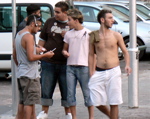 Both have been out for about a year and have had a couple of previous boyfriends who lasted a few months. Mykel said that gays don’t stay together long but also admitted he didn’t know any long-term older couples. He dated a “much older” guy for a while–who was 25–but they broke up because the boyfriend planned to go to medical school in Hungary and Mykel did not want to wait for him.
Both have been out for about a year and have had a couple of previous boyfriends who lasted a few months. Mykel said that gays don’t stay together long but also admitted he didn’t know any long-term older couples. He dated a “much older” guy for a while–who was 25–but they broke up because the boyfriend planned to go to medical school in Hungary and Mykel did not want to wait for him.
Tal has had one boyfriend before Mykel and seemed less seasoned and more naïve about dating. But at 16 no one can fault him. Mykel cheerfully and easily stated that he was the active partner and Tal enjoyed being the passive one. “It is more natural for me,” he said at Mykel’s prompting, although Tal has tried both positions. (Mykel then wanted to know about the preferred position of this interviewer!)
(Because our time was somewhat rushed—it was near midnight and they had to catch the last bus home—I didn’t follow up on their level of knowledge about safer sex.)
Neither boy goes to the youth groups offered by Aguda, the national LGBT organization based in Tel Aviv with branches all around the country. Mykel said he didn’t need a group since he has friends he’s met online. He was glad to be in Tel Aviv and not in Nahariya. “I’m not going back. It’s a small town and there are only so many gays and everyone knows your business.”
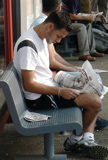 After graduation from high school both boys must serve in the military for two years, gay or not. The Israeli military does not discriminate against gays and they serve with no consequence. When the occasional homophobic behavior happens gay and lesbian soldiers know they have legal and immediate recourse, most often through Aguda who has access to high ranking officers who see that the situation is handled quickly and properly.
After graduation from high school both boys must serve in the military for two years, gay or not. The Israeli military does not discriminate against gays and they serve with no consequence. When the occasional homophobic behavior happens gay and lesbian soldiers know they have legal and immediate recourse, most often through Aguda who has access to high ranking officers who see that the situation is handled quickly and properly.
Tal and Mykel were the youngest gays I spoke to in Israel. For the present they operated outside of the ‘gay community’, insulated partly by their ignorance, their age, their financial dependence and adherence to family restrictions and the requirements of school attendance, as well as their personal choices to join or not join such groups as Israeli Gay Youth (Keshet Ga’avah) (alternative URL) or the Jerusalem Open House youth group. Many youth are disconnected from anything to do with WorldPride and know nothing about this past summer’s ‘gay Olympics’—Gay Games in Chicago and OutGames in Montreal.
But, organized or not, that doesn’t stop young gays from finding fun and friends in this city. Tel Aviv is not a restrictive city and just about any type of entertainment can be found, from American style bars to nearly-nude dance clubs, to drag shows to cruising parks and discos, to gay beaches and cruise parks, to discos, cafes and saunas.
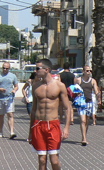 Like many (probably most) young gay Israelis under 18 (and in the military until 20) a major link to other gays and lesbians is the Internet. For Mykel it has obviously allowed him to create a virtual and real social network of friends and sex buddies. Despite the opinion of some observers about the anonymity of the Internet and the safety risks it poses in meeting strangers, most gay kids of the current generation (x? y? z?) have grown up with their laptops and are savvy with the cryptic language used in chat rooms and messaging as well as the unwritten ‘rules of engagement’.
Like many (probably most) young gay Israelis under 18 (and in the military until 20) a major link to other gays and lesbians is the Internet. For Mykel it has obviously allowed him to create a virtual and real social network of friends and sex buddies. Despite the opinion of some observers about the anonymity of the Internet and the safety risks it poses in meeting strangers, most gay kids of the current generation (x? y? z?) have grown up with their laptops and are savvy with the cryptic language used in chat rooms and messaging as well as the unwritten ‘rules of engagement’.
Both Tal and Mykel knew that first meetings should not happen in private or at home, so they arranged to meet at a very public mall where they could first check out each other for appearance from a safe distance even before meeting. Mykel and Tal liked what they saw and took the next step of greeting and talking over coffee to find out about each other. Malls are the most common and safe gathering place for youth in just about every country around the world.
After a while of preliminary familiarity, telling each other what they liked to do in and out of bed, what schools they went to, about their families, and so on, both boys agreed to go to Mykel’s house since his uncle was working and they could be alone for a couple of hours.
Scenes like this are played out with relative ease and safety every day in major cities, from Tel Aviv to Beijing. Gay youth can operate with total privacy and independence from any LGBT organizations. It’s not unusual for gay youth to keep their homosexuality hidden from almost everyone and the Internet does not gossip to one’s family. Secrets are locked behind passwords.
So for now, Tal and Mykel can carry on their affair with little risk of being found out. As time goes on and if mutual compatibility grows they will begin to include other gay friends and later other couples into their secret world. For all that gay Israel has to offer, these boys don’t want to join the outside world yet. Their first steps are together-alone. Hopefully in a year or two or five I will interview them again—together.
(Part 5)
Jerusalem’s Small Gay World–with a Big Flag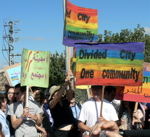
-Jerusalem Open House
-Shushan Bar
Jerusalem Open House
Quite aside from the swirl of WorldPride, Jerusalem is actually a quiet gay town with barely a handful of choices for queer folks. The leading organization of course is Jerusalem Open House, which is not a huge organization but it seemed to loom large as it hosted WorldPride. JOH is a grassroots, activist and social organization of lesbians, gay men, bisexuals, transgenders (LGBT) people, and their allies.
(Be aware there is another organization in Israel called Jerusalem Open House that is a non-gay charity offering free cooked meals to homeless people. See their web site by the same name but with a different web address.)
Founded in 1997 it seeks to make Jerusalem a tolerant place where all people are free to seek self-fulfillment. It offers direct services such as support groups, educational materials, referrals for help and counseling. It also advocates for change on issues such as equal human rights, discrimination, homophobia and freedom of expression. It also arranges parties and gatherings.
In 2002 JOH was proud to organize Jerusalem’s first gay pride parade “against all odds”. JOH is a “refuge for gay Jews and Arabs living in a culture that often rejects them. It’s the only center of its kind in the area.” See related story on JOH.
Shushan Bar
The only other gay venue in conservative Jerusalem is a small bar called Shushan Bar (4 Shushan Street) . During WorldPride week the entry was decorated with flags and inside was populated with locals and visitors from afar chattering and shrugging to the DJ’s house music. A drag show happened one night. But during the day (it opens in the evening) there is nothing to see on the outside except a rude warehouse door, no windows, no name sign, no flags, no rainbow stickers. (One day there was an old pink Volvo parked in front…what could it mean?)
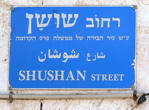 The bland appearance today reveals nothing about the drama that occurred in April 2005 when someone torched Shushan. Here are a few lines from the news report:
The bland appearance today reveals nothing about the drama that occurred in April 2005 when someone torched Shushan. Here are a few lines from the news report:
“Unidentified arsonists set fire to Jerusalem’s only “gay” bar this week ahead of plans, blasted by top religious figures, to bring a world homosexual event here this August that has been blasted by top religious figures.
“Shushan, a homosexual bar near Jerusalem’s bustling Ben Yehuda pedestrian mall, suffered significant fire damage earlier this week when a man entered the doorway of the club and threw a burning rag inside. Flames spread quickly but patrons escaped without injury.
” A Jerusalem police spokeswoman told WND an investigation is under way to determine whether or not the arson was in protest of World Pride, a mass international gathering of homosexual, lesbian, bisexual and transgender individuals slated to take place in Jerusalem this summer. Shushan owner Sa’ar Netanel is part of a coalition planning the event.”The police will investigate and we’ll see,” said Netanel. “This is the first time the club [has been] attacked, but I already received threats on my life.”
Full story at:http://www.worldnetdaily.com/news/article.asp?ARTICLE_ID=44030
(Part 6)
Gay Rights: Progress amidst painful history and dense politics
From Gay Times:
http://www.gaytimes.co.uk/gt/listings.asp?action=ShowCountry&CID=512
“The nineties have seen considerable progress for the lesbian and gay movement, with the establishment of a Knesset subcommittee on LGB rights in 1993, the passage of employment protection legislation in 1992, the ending of discriminatory rules in the military in 1993, a Supreme Court judgment in 1994 in favor of equal domestic partner employment benefits and the passing of anti-discrimination legislation making homophobic remarks or actions illegal in 1998.
“In 2000 the age of consent was lowered to 16 and most recently in 2005 a court allowed a lesbian couple to adopt a child.
“Gay rights and anti-discrimination legislation was passed, in pieces, during the 1990s, and then only somewhat surreptitiously by a liberal government at the time (under Itzak Rabin), which recognized the inequalities regarding gay citizens.”
Still the level of religious and secular homophobia is palpable in many smaller towns across the country. Only in larger urban pockets do LGBT citizens feel safe to express their presence, most notably in Tel Aviv, easily the most secular and European city in Israel.
For a history of organized gay life in Israel (2002) see ‘Queer in the Land of Sodom’.
Also see a critical analysis by Hagai El-Ad (hagalul@yahoo.com) the Executive Director of Jerusalem Open House (story)

